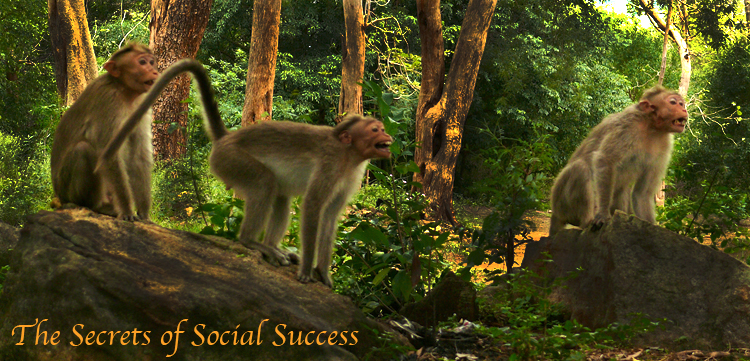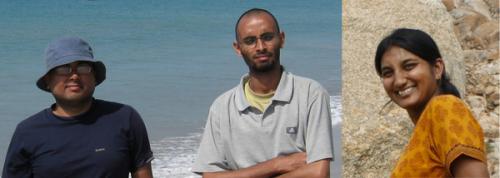Secrets of Social Success

Cooperative Aggression: three male Bonnet Macaques from one troop try to scare off an intruding male (not shown). Photo: Subhankar Chakraborty. Edited by Geoff Hyde
Up until 5 years ago the Bonnet Macaques, like the world’s other twenty-odd macaque species, were conveniently contained in one of four “grades” of a “Macaque Social Style” system devised by a French-Canadian team (for more: see here). Based on observations that showed that Bonnet Macaques were rather likely to “make up after a fight” they were placed near the conciliatory end of the social style spectrum - Grade 3. In contrast, India’s other common macaque, the Rhesus Macaque, was typed as a vengeful Grade 1. Also, it was reported that the conciliatory tendency seemed to predict the species’ general “egalitarian” or “despotic” nature: troops of Rhesus Macaques for example are highly hierarchical, and, in a remarkable example of cultural transmission, a daughter eventually inherits her mother’s ranking in the pecking order. The importance of fear and rank in the Rhesus' social order has earned them the sobriquet, Macachiavellian.
There was also an attractive hypothesis, proposed by a Euro-American team, to explain how the variation in macaque sociality arises at the cellular level (see paper here). They analysed seven species that spanned the full macaque social spectrum, focussing on a gene-like element that influences the robustness of a cellular mechanism by which the neurotransmitter serotonin is scavenged from the synaptic space and returned to the source neuron. The strength of the conciliatory tendency appeared to correlate to the expected robustness of serotonin scavenging. Animals of the conciliatory Grade 4 species all had the same two “robust” alleles for the gene-like element. In despotic Grade 1 species, like the Rhesus, however there was considerable variation: some individuals had two “robust” alleles, others had only one or none. This pattern echoed a very well-known phenomenom of human psychology: people who do not have two copies of the “robust” serotonin allele are more likely to develop depression when exposed to stressful life circumstances. And, it all pointed to the idea that the behavioural options of any given macaque species were constrained, to their “Grade” as it were, by their evolutionary heritage.

Three of the six authors of the Behavior Genetics paper (L-R): Debapriyo Chakraborty • Subhankar Chakraborty • Uma Ramakrishnan
But it now seems likely that the story is not so simple, even if it does involve the same themes and characters. To start with, a paper first-authored by Anindya Sinha in 2005 reported that the social life of Bonnet Macaques is more flexible than previously thought (see paper here). Of the 21 troops of Bonnet Macaques studied in Mudumalai Wildlife Sanctuary, only 10 troops had the expected conciliatory, Grade 3 social structure. They consisted of a mix of males and females, ranging from the smallest group (8 females, 2 males) up to the largest (26 females, 6 males). The other 11 troops were strict “harems” each dominated by one highly aggressive male that drove off the males of other troops, and (apparently) even his own sons. This structure is much closer to the non-conciliatory Grade 1 pattern and was found in troops whose territories stretched along tourist-travelled roads of the park. The troops had fewer female members (smallest: 8, largest: 17) than those found deeper in the forest and it is likely that a single male finds it less challenging to maintain a despotic dominance in these circumstances. The food provided by the tourist traffic is rather inconsistent in terms of both volume and quality, and requires the Bonnet Macaques to spend a lot of time waiting and watching. This has probably driven down the size of the troops that have come to depend on roadside dining.
The need for further revisions to the story were indicated in the just-published study in Behavior Genetics. Sinha teamed up with colleagues from NCBS, NIAS and NIMH (all in Bangalore) and the Nature Conservation Foundation (Mysore) to canvass, with respect to the gene involved in serotonin scavenging, several of the species that had been left out of the Euro-American study. Most importantly, that study did not include the Bonnet Macaque. While the categorisation of the Bonnet Macaque as a conciliatory Grade 3 species predicts that all individuals should have two “robust” alleles, the Indian team found that they were as likely to have the non-robust alleles as the non-conciliatory Rhesus Macaques. They suggest that variation in the serotonin scavenging system, rather than defining a fixed type of sociality for a macaque species, determines instead its social flexibility. They propose that the extraordinary environmental adaptability of both Rhesus and Bonnet Macaques is in part enabled by their capacity to adjust their social structure to suit the different types of resource-gathering that they employ in different habitats. And this flexibility depends on these species being able to draw upon a reservoir of genetic variation.
In making these suggestions, the Indian team was also in tune with the very newest ideas about the role of the serotonin scavenging system in human psychology and evolution. In 2009 Belsky and his colleagues re-examined the studies that showed that people who do not have both copies of the “robust” allele are more depression-susceptible (see paper here). The team uncovered a fascinating pattern. While people with non-robust alleles are more susceptible under stressful circumstances, the original researchers had overlooked the fact that in neutral or positive environments, these people actually show a lower tendency to depression. Likewise Belsky's team found that other genetic configurations considered to make people vulnerable to being violent or anxious actually confer their bearers with psychological advantages in non-stressful conditions. So, various problematic alleles that had been seen as bad news for both the individuals involved, and the wider society, are likely part of a reservoir of useful variation, as suggested for Bonnet and Rhesus Macaques. Our ability to adapt to different environmental circumstances throughout our evolutionary history may have been enabled, like the macaques, by an enriched social flexibility, in turn enabled by our species’ spurning of any one “best” set of behavioural genes. As they say: “It takes all kinds”.
And as the future presents us with environmental challenges that will require us to pull together on an unprecedented scale, we may find that the behavioural toolbox we thought rather lacking has in fact always had a secret compartment brimming with genetic surprises hardwon over countless millennia.
Comments
Post new comment